Taxation Law: Australian Income Tax and the Shared Economy Compliance
VerifiedAdded on 2023/03/17
|10
|2782
|55
Essay
AI Summary
This essay delves into the challenges of ensuring shared economy providers, such as Uber drivers, Airbnb hosts, Airtasker workers, and Deliveroo drivers, comply with Australian income tax laws. It examines the current regulatory landscape and the difficulties faced by the Australian Taxation Office (ATO) in accurately assessing and collecting taxes from these individuals. The essay highlights issues like under-reporting of income, lack of awareness regarding tax obligations, and the informal nature of the gig economy. It also discusses the ATO's efforts to improve compliance through new reporting regimes and data-matching initiatives. Furthermore, the essay proposes and analyzes two key strategies for enhancing tax compliance: implementing tax instalment regimes and leveraging technology-centered policy responses. The essay concludes by emphasizing the importance of adequately capturing the shared economy under the tax code to generate revenue and promote fairness.
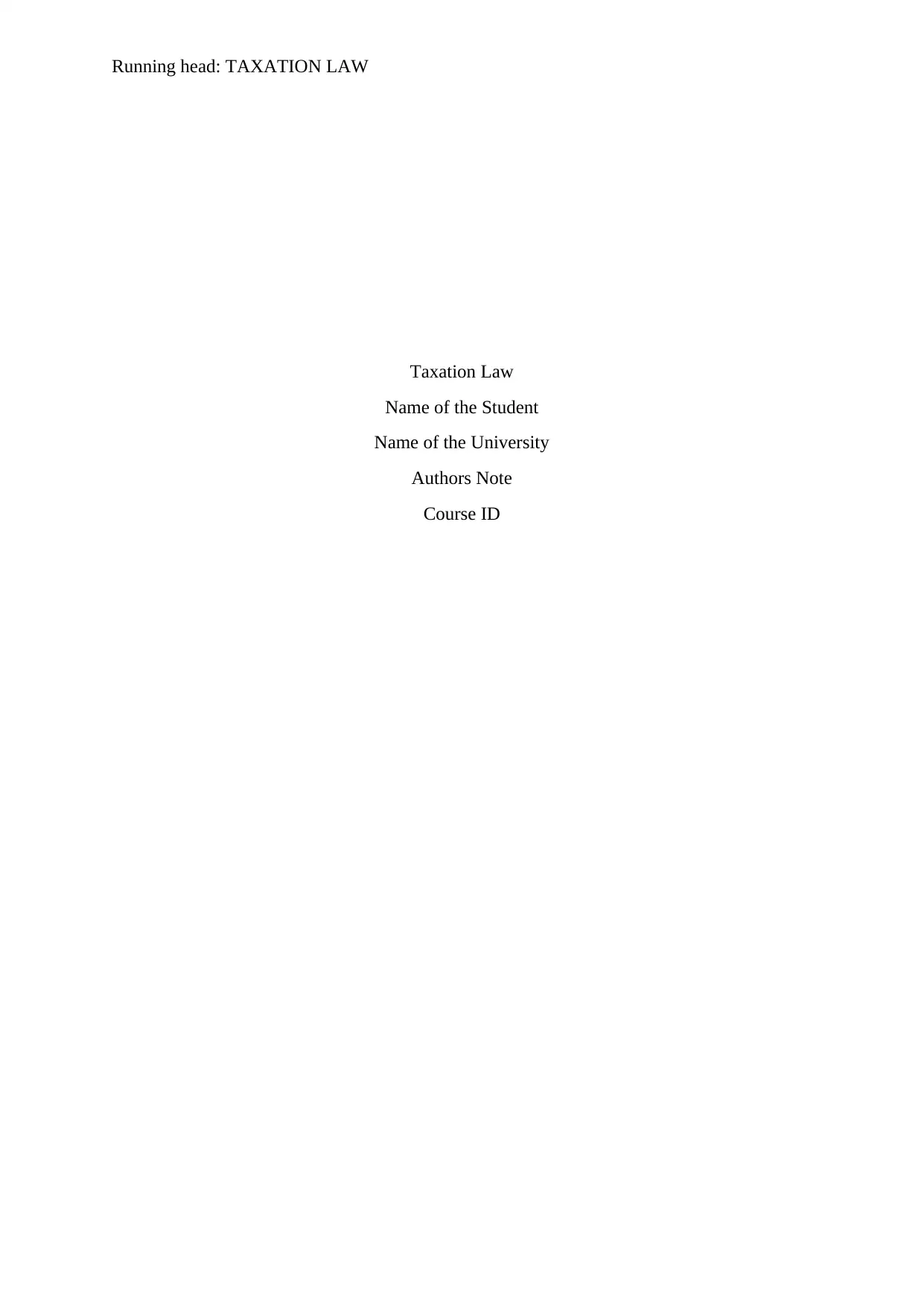
Running head: TAXATION LAW
Taxation Law
Name of the Student
Name of the University
Authors Note
Course ID
Taxation Law
Name of the Student
Name of the University
Authors Note
Course ID
Paraphrase This Document
Need a fresh take? Get an instant paraphrase of this document with our AI Paraphraser
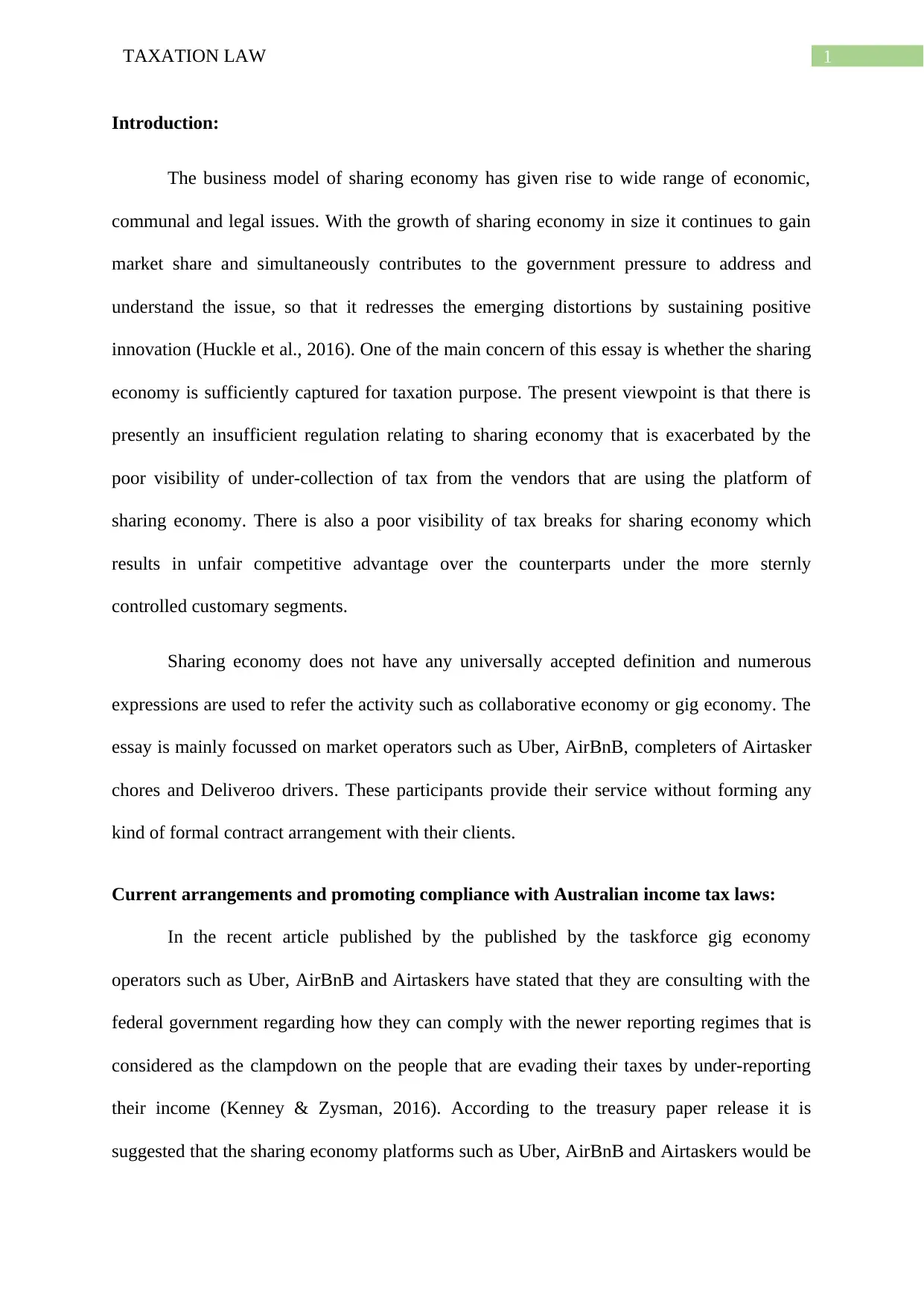
1TAXATION LAW
Introduction:
The business model of sharing economy has given rise to wide range of economic,
communal and legal issues. With the growth of sharing economy in size it continues to gain
market share and simultaneously contributes to the government pressure to address and
understand the issue, so that it redresses the emerging distortions by sustaining positive
innovation (Huckle et al., 2016). One of the main concern of this essay is whether the sharing
economy is sufficiently captured for taxation purpose. The present viewpoint is that there is
presently an insufficient regulation relating to sharing economy that is exacerbated by the
poor visibility of under-collection of tax from the vendors that are using the platform of
sharing economy. There is also a poor visibility of tax breaks for sharing economy which
results in unfair competitive advantage over the counterparts under the more sternly
controlled customary segments.
Sharing economy does not have any universally accepted definition and numerous
expressions are used to refer the activity such as collaborative economy or gig economy. The
essay is mainly focussed on market operators such as Uber, AirBnB, completers of Airtasker
chores and Deliveroo drivers. These participants provide their service without forming any
kind of formal contract arrangement with their clients.
Current arrangements and promoting compliance with Australian income tax laws:
In the recent article published by the published by the taskforce gig economy
operators such as Uber, AirBnB and Airtaskers have stated that they are consulting with the
federal government regarding how they can comply with the newer reporting regimes that is
considered as the clampdown on the people that are evading their taxes by under-reporting
their income (Kenney & Zysman, 2016). According to the treasury paper release it is
suggested that the sharing economy platforms such as Uber, AirBnB and Airtaskers would be
Introduction:
The business model of sharing economy has given rise to wide range of economic,
communal and legal issues. With the growth of sharing economy in size it continues to gain
market share and simultaneously contributes to the government pressure to address and
understand the issue, so that it redresses the emerging distortions by sustaining positive
innovation (Huckle et al., 2016). One of the main concern of this essay is whether the sharing
economy is sufficiently captured for taxation purpose. The present viewpoint is that there is
presently an insufficient regulation relating to sharing economy that is exacerbated by the
poor visibility of under-collection of tax from the vendors that are using the platform of
sharing economy. There is also a poor visibility of tax breaks for sharing economy which
results in unfair competitive advantage over the counterparts under the more sternly
controlled customary segments.
Sharing economy does not have any universally accepted definition and numerous
expressions are used to refer the activity such as collaborative economy or gig economy. The
essay is mainly focussed on market operators such as Uber, AirBnB, completers of Airtasker
chores and Deliveroo drivers. These participants provide their service without forming any
kind of formal contract arrangement with their clients.
Current arrangements and promoting compliance with Australian income tax laws:
In the recent article published by the published by the taskforce gig economy
operators such as Uber, AirBnB and Airtaskers have stated that they are consulting with the
federal government regarding how they can comply with the newer reporting regimes that is
considered as the clampdown on the people that are evading their taxes by under-reporting
their income (Kenney & Zysman, 2016). According to the treasury paper release it is
suggested that the sharing economy platforms such as Uber, AirBnB and Airtaskers would be
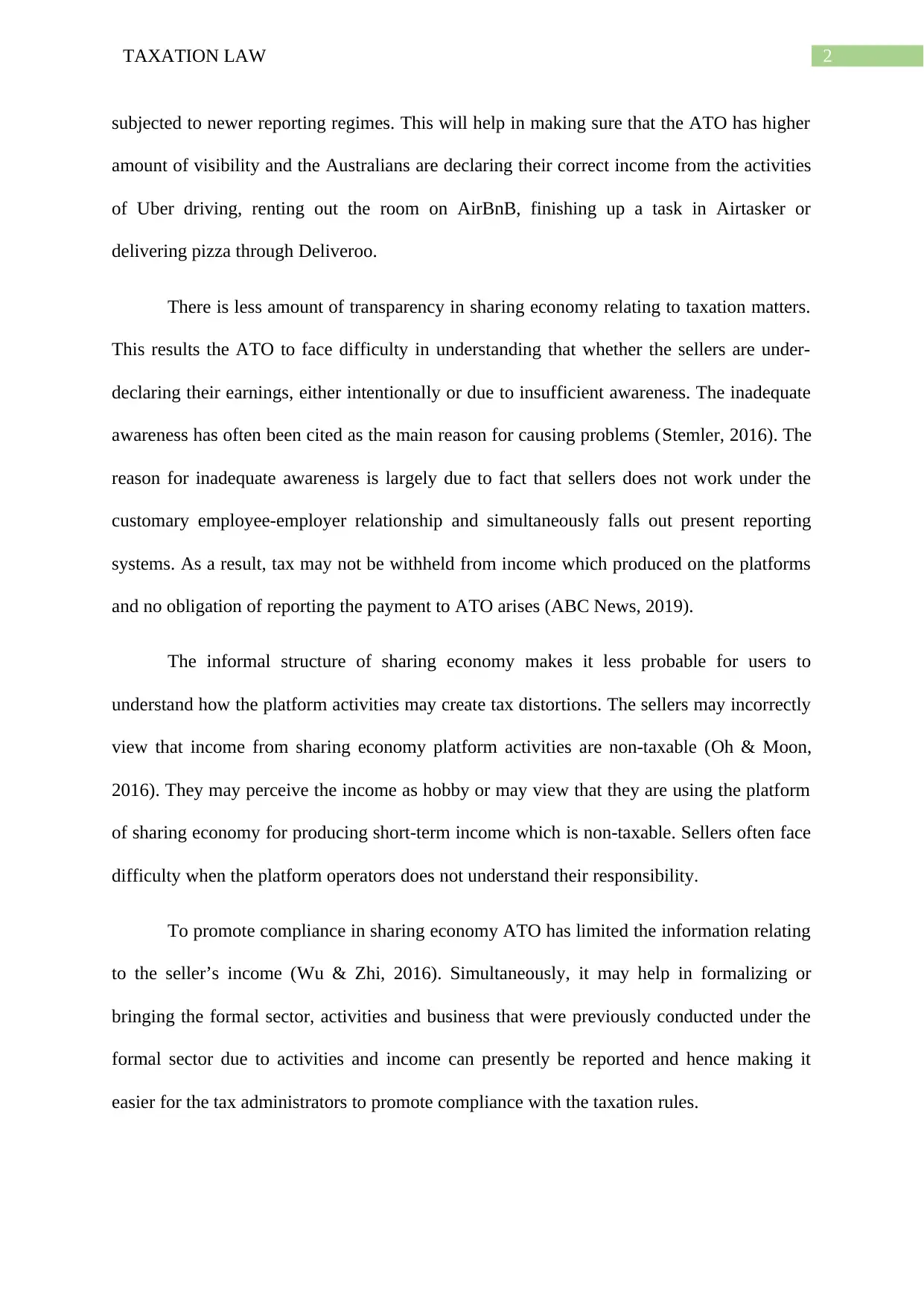
2TAXATION LAW
subjected to newer reporting regimes. This will help in making sure that the ATO has higher
amount of visibility and the Australians are declaring their correct income from the activities
of Uber driving, renting out the room on AirBnB, finishing up a task in Airtasker or
delivering pizza through Deliveroo.
There is less amount of transparency in sharing economy relating to taxation matters.
This results the ATO to face difficulty in understanding that whether the sellers are under-
declaring their earnings, either intentionally or due to insufficient awareness. The inadequate
awareness has often been cited as the main reason for causing problems (Stemler, 2016). The
reason for inadequate awareness is largely due to fact that sellers does not work under the
customary employee-employer relationship and simultaneously falls out present reporting
systems. As a result, tax may not be withheld from income which produced on the platforms
and no obligation of reporting the payment to ATO arises (ABC News, 2019).
The informal structure of sharing economy makes it less probable for users to
understand how the platform activities may create tax distortions. The sellers may incorrectly
view that income from sharing economy platform activities are non-taxable (Oh & Moon,
2016). They may perceive the income as hobby or may view that they are using the platform
of sharing economy for producing short-term income which is non-taxable. Sellers often face
difficulty when the platform operators does not understand their responsibility.
To promote compliance in sharing economy ATO has limited the information relating
to the seller’s income (Wu & Zhi, 2016). Simultaneously, it may help in formalizing or
bringing the formal sector, activities and business that were previously conducted under the
formal sector due to activities and income can presently be reported and hence making it
easier for the tax administrators to promote compliance with the taxation rules.
subjected to newer reporting regimes. This will help in making sure that the ATO has higher
amount of visibility and the Australians are declaring their correct income from the activities
of Uber driving, renting out the room on AirBnB, finishing up a task in Airtasker or
delivering pizza through Deliveroo.
There is less amount of transparency in sharing economy relating to taxation matters.
This results the ATO to face difficulty in understanding that whether the sellers are under-
declaring their earnings, either intentionally or due to insufficient awareness. The inadequate
awareness has often been cited as the main reason for causing problems (Stemler, 2016). The
reason for inadequate awareness is largely due to fact that sellers does not work under the
customary employee-employer relationship and simultaneously falls out present reporting
systems. As a result, tax may not be withheld from income which produced on the platforms
and no obligation of reporting the payment to ATO arises (ABC News, 2019).
The informal structure of sharing economy makes it less probable for users to
understand how the platform activities may create tax distortions. The sellers may incorrectly
view that income from sharing economy platform activities are non-taxable (Oh & Moon,
2016). They may perceive the income as hobby or may view that they are using the platform
of sharing economy for producing short-term income which is non-taxable. Sellers often face
difficulty when the platform operators does not understand their responsibility.
To promote compliance in sharing economy ATO has limited the information relating
to the seller’s income (Wu & Zhi, 2016). Simultaneously, it may help in formalizing or
bringing the formal sector, activities and business that were previously conducted under the
formal sector due to activities and income can presently be reported and hence making it
easier for the tax administrators to promote compliance with the taxation rules.
⊘ This is a preview!⊘
Do you want full access?
Subscribe today to unlock all pages.

Trusted by 1+ million students worldwide
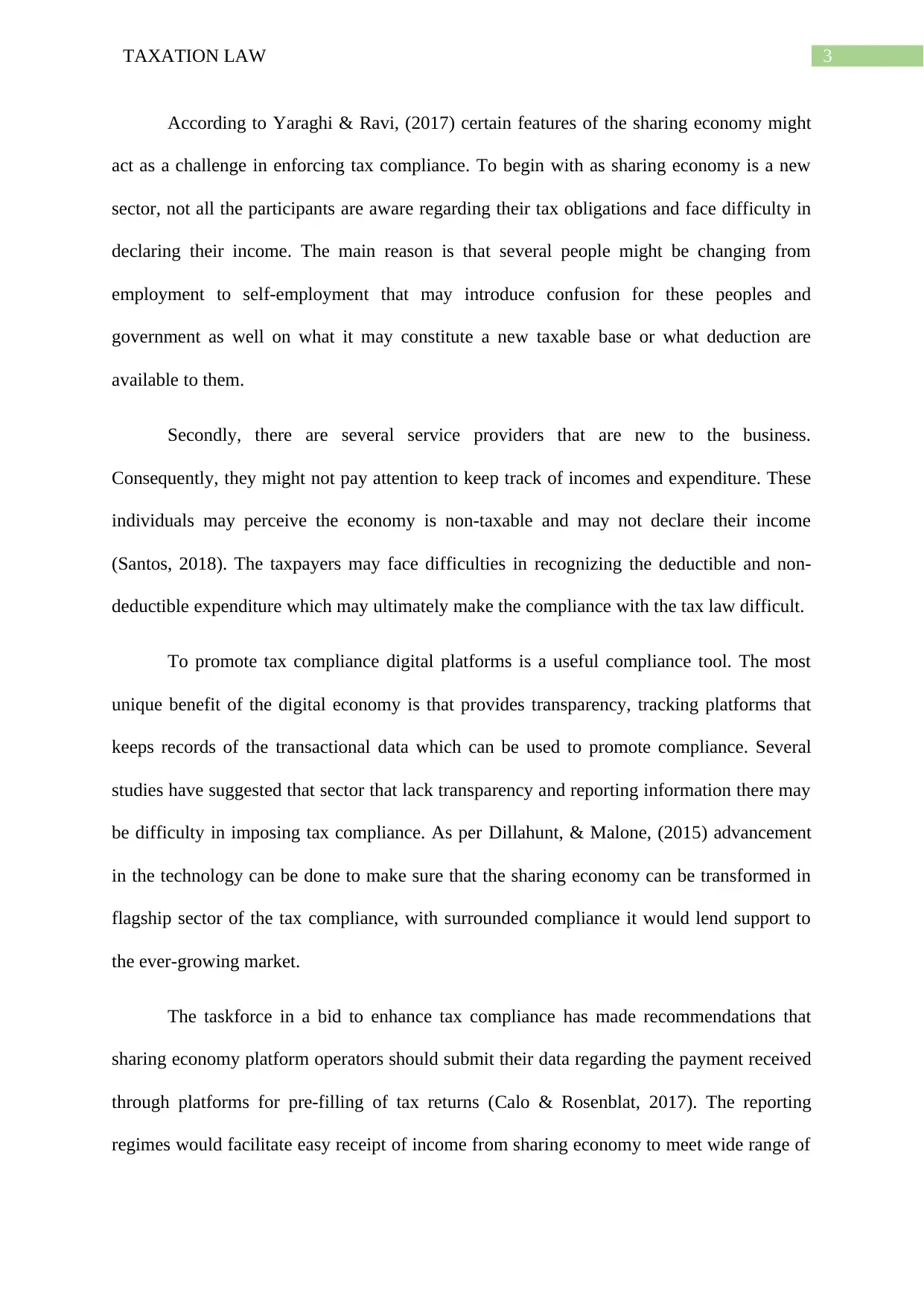
3TAXATION LAW
According to Yaraghi & Ravi, (2017) certain features of the sharing economy might
act as a challenge in enforcing tax compliance. To begin with as sharing economy is a new
sector, not all the participants are aware regarding their tax obligations and face difficulty in
declaring their income. The main reason is that several people might be changing from
employment to self-employment that may introduce confusion for these peoples and
government as well on what it may constitute a new taxable base or what deduction are
available to them.
Secondly, there are several service providers that are new to the business.
Consequently, they might not pay attention to keep track of incomes and expenditure. These
individuals may perceive the economy is non-taxable and may not declare their income
(Santos, 2018). The taxpayers may face difficulties in recognizing the deductible and non-
deductible expenditure which may ultimately make the compliance with the tax law difficult.
To promote tax compliance digital platforms is a useful compliance tool. The most
unique benefit of the digital economy is that provides transparency, tracking platforms that
keeps records of the transactional data which can be used to promote compliance. Several
studies have suggested that sector that lack transparency and reporting information there may
be difficulty in imposing tax compliance. As per Dillahunt, & Malone, (2015) advancement
in the technology can be done to make sure that the sharing economy can be transformed in
flagship sector of the tax compliance, with surrounded compliance it would lend support to
the ever-growing market.
The taskforce in a bid to enhance tax compliance has made recommendations that
sharing economy platform operators should submit their data regarding the payment received
through platforms for pre-filling of tax returns (Calo & Rosenblat, 2017). The reporting
regimes would facilitate easy receipt of income from sharing economy to meet wide range of
According to Yaraghi & Ravi, (2017) certain features of the sharing economy might
act as a challenge in enforcing tax compliance. To begin with as sharing economy is a new
sector, not all the participants are aware regarding their tax obligations and face difficulty in
declaring their income. The main reason is that several people might be changing from
employment to self-employment that may introduce confusion for these peoples and
government as well on what it may constitute a new taxable base or what deduction are
available to them.
Secondly, there are several service providers that are new to the business.
Consequently, they might not pay attention to keep track of incomes and expenditure. These
individuals may perceive the economy is non-taxable and may not declare their income
(Santos, 2018). The taxpayers may face difficulties in recognizing the deductible and non-
deductible expenditure which may ultimately make the compliance with the tax law difficult.
To promote tax compliance digital platforms is a useful compliance tool. The most
unique benefit of the digital economy is that provides transparency, tracking platforms that
keeps records of the transactional data which can be used to promote compliance. Several
studies have suggested that sector that lack transparency and reporting information there may
be difficulty in imposing tax compliance. As per Dillahunt, & Malone, (2015) advancement
in the technology can be done to make sure that the sharing economy can be transformed in
flagship sector of the tax compliance, with surrounded compliance it would lend support to
the ever-growing market.
The taskforce in a bid to enhance tax compliance has made recommendations that
sharing economy platform operators should submit their data regarding the payment received
through platforms for pre-filling of tax returns (Calo & Rosenblat, 2017). The reporting
regimes would facilitate easy receipt of income from sharing economy to meet wide range of
Paraphrase This Document
Need a fresh take? Get an instant paraphrase of this document with our AI Paraphraser
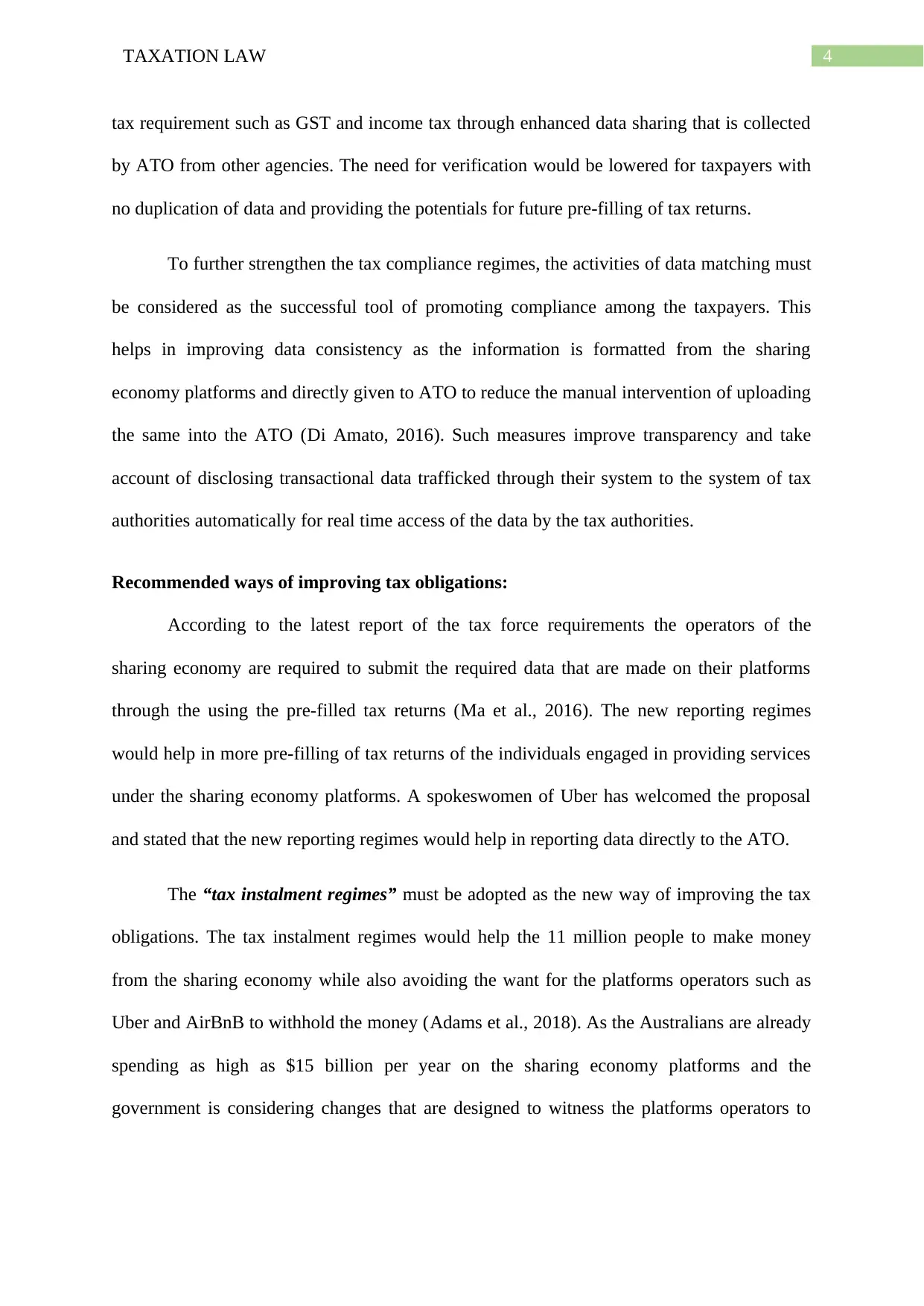
4TAXATION LAW
tax requirement such as GST and income tax through enhanced data sharing that is collected
by ATO from other agencies. The need for verification would be lowered for taxpayers with
no duplication of data and providing the potentials for future pre-filling of tax returns.
To further strengthen the tax compliance regimes, the activities of data matching must
be considered as the successful tool of promoting compliance among the taxpayers. This
helps in improving data consistency as the information is formatted from the sharing
economy platforms and directly given to ATO to reduce the manual intervention of uploading
the same into the ATO (Di Amato, 2016). Such measures improve transparency and take
account of disclosing transactional data trafficked through their system to the system of tax
authorities automatically for real time access of the data by the tax authorities.
Recommended ways of improving tax obligations:
According to the latest report of the tax force requirements the operators of the
sharing economy are required to submit the required data that are made on their platforms
through the using the pre-filled tax returns (Ma et al., 2016). The new reporting regimes
would help in more pre-filling of tax returns of the individuals engaged in providing services
under the sharing economy platforms. A spokeswomen of Uber has welcomed the proposal
and stated that the new reporting regimes would help in reporting data directly to the ATO.
The “tax instalment regimes” must be adopted as the new way of improving the tax
obligations. The tax instalment regimes would help the 11 million people to make money
from the sharing economy while also avoiding the want for the platforms operators such as
Uber and AirBnB to withhold the money (Adams et al., 2018). As the Australians are already
spending as high as $15 billion per year on the sharing economy platforms and the
government is considering changes that are designed to witness the platforms operators to
tax requirement such as GST and income tax through enhanced data sharing that is collected
by ATO from other agencies. The need for verification would be lowered for taxpayers with
no duplication of data and providing the potentials for future pre-filling of tax returns.
To further strengthen the tax compliance regimes, the activities of data matching must
be considered as the successful tool of promoting compliance among the taxpayers. This
helps in improving data consistency as the information is formatted from the sharing
economy platforms and directly given to ATO to reduce the manual intervention of uploading
the same into the ATO (Di Amato, 2016). Such measures improve transparency and take
account of disclosing transactional data trafficked through their system to the system of tax
authorities automatically for real time access of the data by the tax authorities.
Recommended ways of improving tax obligations:
According to the latest report of the tax force requirements the operators of the
sharing economy are required to submit the required data that are made on their platforms
through the using the pre-filled tax returns (Ma et al., 2016). The new reporting regimes
would help in more pre-filling of tax returns of the individuals engaged in providing services
under the sharing economy platforms. A spokeswomen of Uber has welcomed the proposal
and stated that the new reporting regimes would help in reporting data directly to the ATO.
The “tax instalment regimes” must be adopted as the new way of improving the tax
obligations. The tax instalment regimes would help the 11 million people to make money
from the sharing economy while also avoiding the want for the platforms operators such as
Uber and AirBnB to withhold the money (Adams et al., 2018). As the Australians are already
spending as high as $15 billion per year on the sharing economy platforms and the
government is considering changes that are designed to witness the platforms operators to
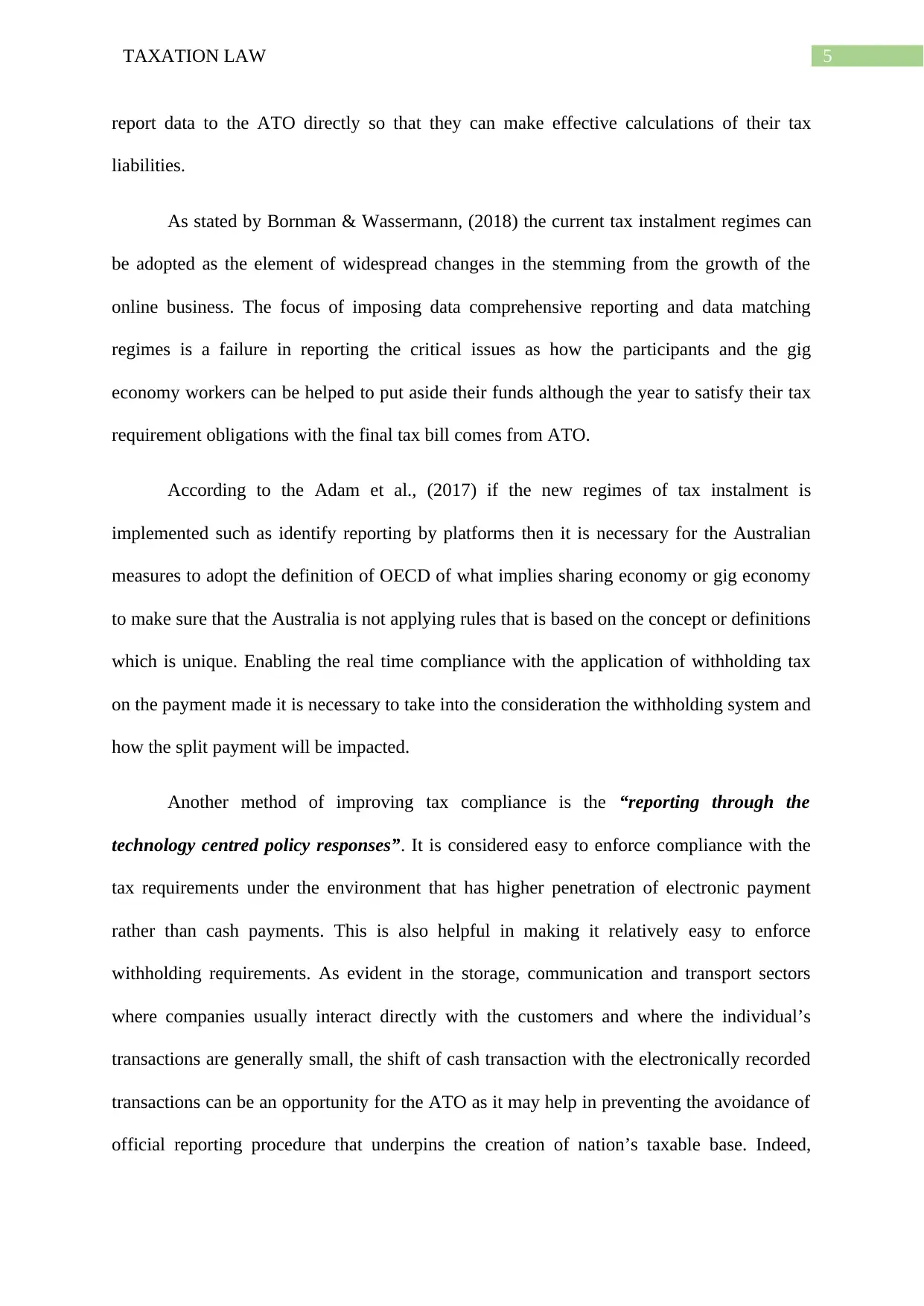
5TAXATION LAW
report data to the ATO directly so that they can make effective calculations of their tax
liabilities.
As stated by Bornman & Wassermann, (2018) the current tax instalment regimes can
be adopted as the element of widespread changes in the stemming from the growth of the
online business. The focus of imposing data comprehensive reporting and data matching
regimes is a failure in reporting the critical issues as how the participants and the gig
economy workers can be helped to put aside their funds although the year to satisfy their tax
requirement obligations with the final tax bill comes from ATO.
According to the Adam et al., (2017) if the new regimes of tax instalment is
implemented such as identify reporting by platforms then it is necessary for the Australian
measures to adopt the definition of OECD of what implies sharing economy or gig economy
to make sure that the Australia is not applying rules that is based on the concept or definitions
which is unique. Enabling the real time compliance with the application of withholding tax
on the payment made it is necessary to take into the consideration the withholding system and
how the split payment will be impacted.
Another method of improving tax compliance is the “reporting through the
technology centred policy responses”. It is considered easy to enforce compliance with the
tax requirements under the environment that has higher penetration of electronic payment
rather than cash payments. This is also helpful in making it relatively easy to enforce
withholding requirements. As evident in the storage, communication and transport sectors
where companies usually interact directly with the customers and where the individual’s
transactions are generally small, the shift of cash transaction with the electronically recorded
transactions can be an opportunity for the ATO as it may help in preventing the avoidance of
official reporting procedure that underpins the creation of nation’s taxable base. Indeed,
report data to the ATO directly so that they can make effective calculations of their tax
liabilities.
As stated by Bornman & Wassermann, (2018) the current tax instalment regimes can
be adopted as the element of widespread changes in the stemming from the growth of the
online business. The focus of imposing data comprehensive reporting and data matching
regimes is a failure in reporting the critical issues as how the participants and the gig
economy workers can be helped to put aside their funds although the year to satisfy their tax
requirement obligations with the final tax bill comes from ATO.
According to the Adam et al., (2017) if the new regimes of tax instalment is
implemented such as identify reporting by platforms then it is necessary for the Australian
measures to adopt the definition of OECD of what implies sharing economy or gig economy
to make sure that the Australia is not applying rules that is based on the concept or definitions
which is unique. Enabling the real time compliance with the application of withholding tax
on the payment made it is necessary to take into the consideration the withholding system and
how the split payment will be impacted.
Another method of improving tax compliance is the “reporting through the
technology centred policy responses”. It is considered easy to enforce compliance with the
tax requirements under the environment that has higher penetration of electronic payment
rather than cash payments. This is also helpful in making it relatively easy to enforce
withholding requirements. As evident in the storage, communication and transport sectors
where companies usually interact directly with the customers and where the individual’s
transactions are generally small, the shift of cash transaction with the electronically recorded
transactions can be an opportunity for the ATO as it may help in preventing the avoidance of
official reporting procedure that underpins the creation of nation’s taxable base. Indeed,
⊘ This is a preview!⊘
Do you want full access?
Subscribe today to unlock all pages.

Trusted by 1+ million students worldwide
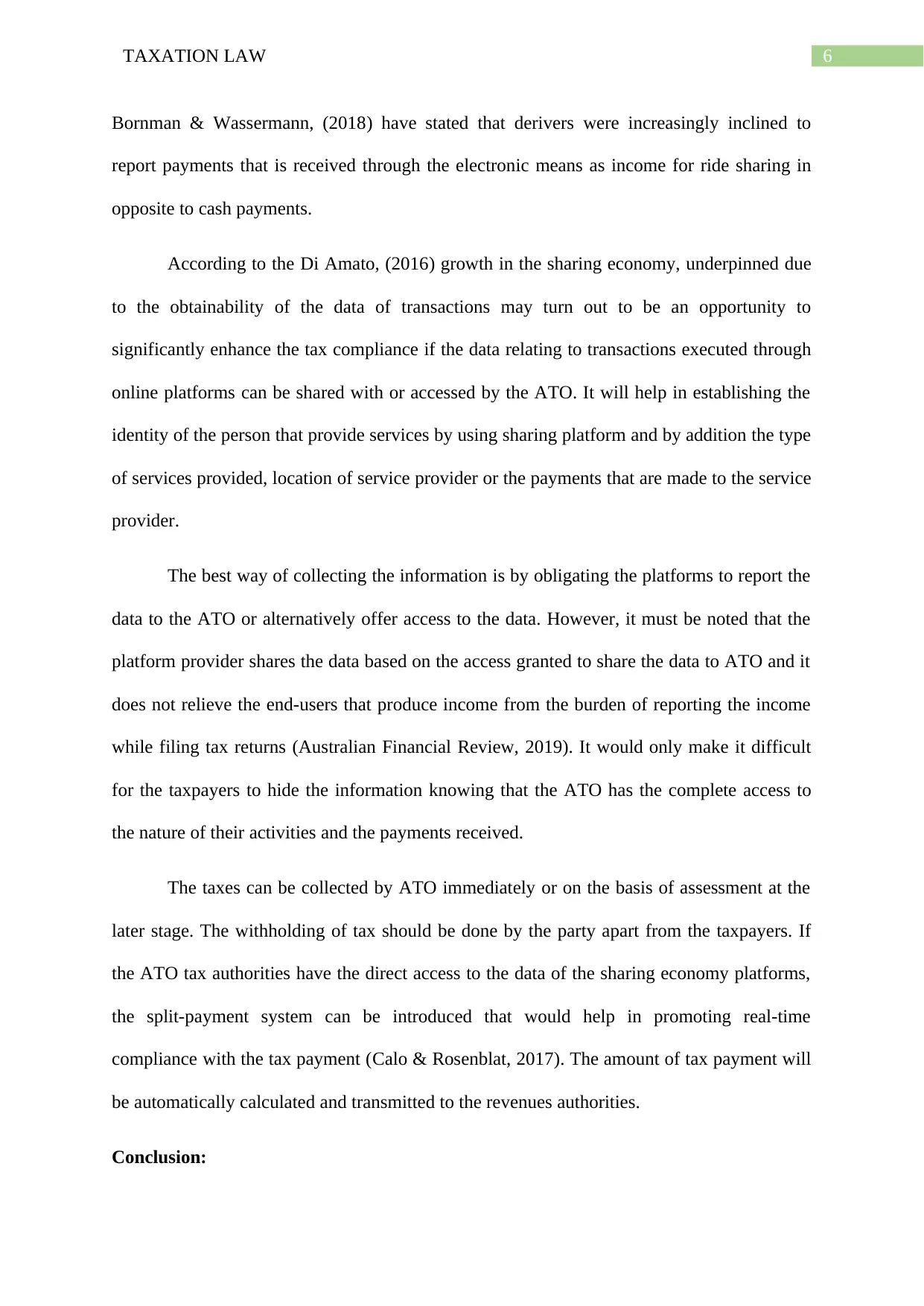
6TAXATION LAW
Bornman & Wassermann, (2018) have stated that derivers were increasingly inclined to
report payments that is received through the electronic means as income for ride sharing in
opposite to cash payments.
According to the Di Amato, (2016) growth in the sharing economy, underpinned due
to the obtainability of the data of transactions may turn out to be an opportunity to
significantly enhance the tax compliance if the data relating to transactions executed through
online platforms can be shared with or accessed by the ATO. It will help in establishing the
identity of the person that provide services by using sharing platform and by addition the type
of services provided, location of service provider or the payments that are made to the service
provider.
The best way of collecting the information is by obligating the platforms to report the
data to the ATO or alternatively offer access to the data. However, it must be noted that the
platform provider shares the data based on the access granted to share the data to ATO and it
does not relieve the end-users that produce income from the burden of reporting the income
while filing tax returns (Australian Financial Review, 2019). It would only make it difficult
for the taxpayers to hide the information knowing that the ATO has the complete access to
the nature of their activities and the payments received.
The taxes can be collected by ATO immediately or on the basis of assessment at the
later stage. The withholding of tax should be done by the party apart from the taxpayers. If
the ATO tax authorities have the direct access to the data of the sharing economy platforms,
the split-payment system can be introduced that would help in promoting real-time
compliance with the tax payment (Calo & Rosenblat, 2017). The amount of tax payment will
be automatically calculated and transmitted to the revenues authorities.
Conclusion:
Bornman & Wassermann, (2018) have stated that derivers were increasingly inclined to
report payments that is received through the electronic means as income for ride sharing in
opposite to cash payments.
According to the Di Amato, (2016) growth in the sharing economy, underpinned due
to the obtainability of the data of transactions may turn out to be an opportunity to
significantly enhance the tax compliance if the data relating to transactions executed through
online platforms can be shared with or accessed by the ATO. It will help in establishing the
identity of the person that provide services by using sharing platform and by addition the type
of services provided, location of service provider or the payments that are made to the service
provider.
The best way of collecting the information is by obligating the platforms to report the
data to the ATO or alternatively offer access to the data. However, it must be noted that the
platform provider shares the data based on the access granted to share the data to ATO and it
does not relieve the end-users that produce income from the burden of reporting the income
while filing tax returns (Australian Financial Review, 2019). It would only make it difficult
for the taxpayers to hide the information knowing that the ATO has the complete access to
the nature of their activities and the payments received.
The taxes can be collected by ATO immediately or on the basis of assessment at the
later stage. The withholding of tax should be done by the party apart from the taxpayers. If
the ATO tax authorities have the direct access to the data of the sharing economy platforms,
the split-payment system can be introduced that would help in promoting real-time
compliance with the tax payment (Calo & Rosenblat, 2017). The amount of tax payment will
be automatically calculated and transmitted to the revenues authorities.
Conclusion:
Paraphrase This Document
Need a fresh take? Get an instant paraphrase of this document with our AI Paraphraser
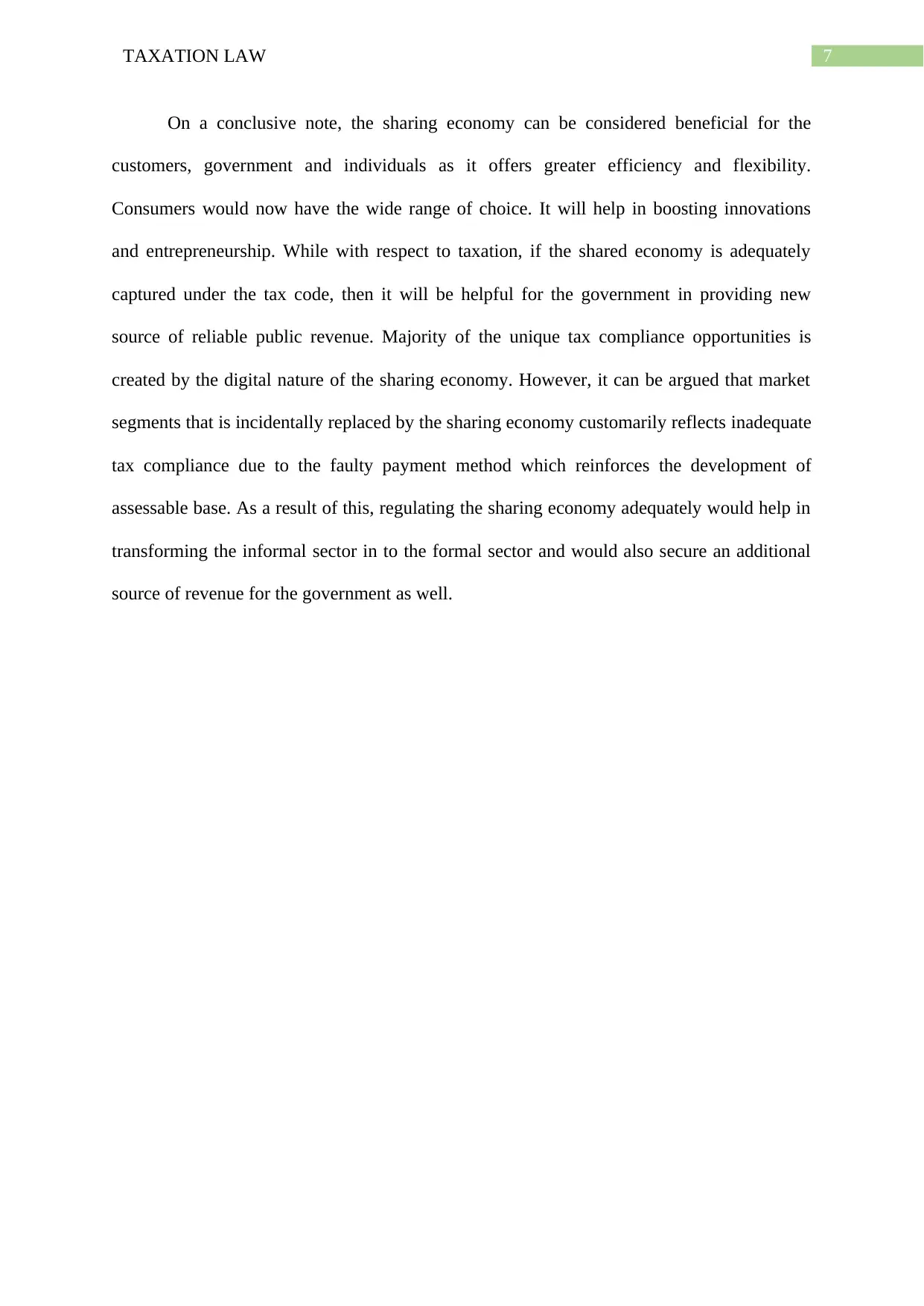
7TAXATION LAW
On a conclusive note, the sharing economy can be considered beneficial for the
customers, government and individuals as it offers greater efficiency and flexibility.
Consumers would now have the wide range of choice. It will help in boosting innovations
and entrepreneurship. While with respect to taxation, if the shared economy is adequately
captured under the tax code, then it will be helpful for the government in providing new
source of reliable public revenue. Majority of the unique tax compliance opportunities is
created by the digital nature of the sharing economy. However, it can be argued that market
segments that is incidentally replaced by the sharing economy customarily reflects inadequate
tax compliance due to the faulty payment method which reinforces the development of
assessable base. As a result of this, regulating the sharing economy adequately would help in
transforming the informal sector in to the formal sector and would also secure an additional
source of revenue for the government as well.
On a conclusive note, the sharing economy can be considered beneficial for the
customers, government and individuals as it offers greater efficiency and flexibility.
Consumers would now have the wide range of choice. It will help in boosting innovations
and entrepreneurship. While with respect to taxation, if the shared economy is adequately
captured under the tax code, then it will be helpful for the government in providing new
source of reliable public revenue. Majority of the unique tax compliance opportunities is
created by the digital nature of the sharing economy. However, it can be argued that market
segments that is incidentally replaced by the sharing economy customarily reflects inadequate
tax compliance due to the faulty payment method which reinforces the development of
assessable base. As a result of this, regulating the sharing economy adequately would help in
transforming the informal sector in to the formal sector and would also secure an additional
source of revenue for the government as well.
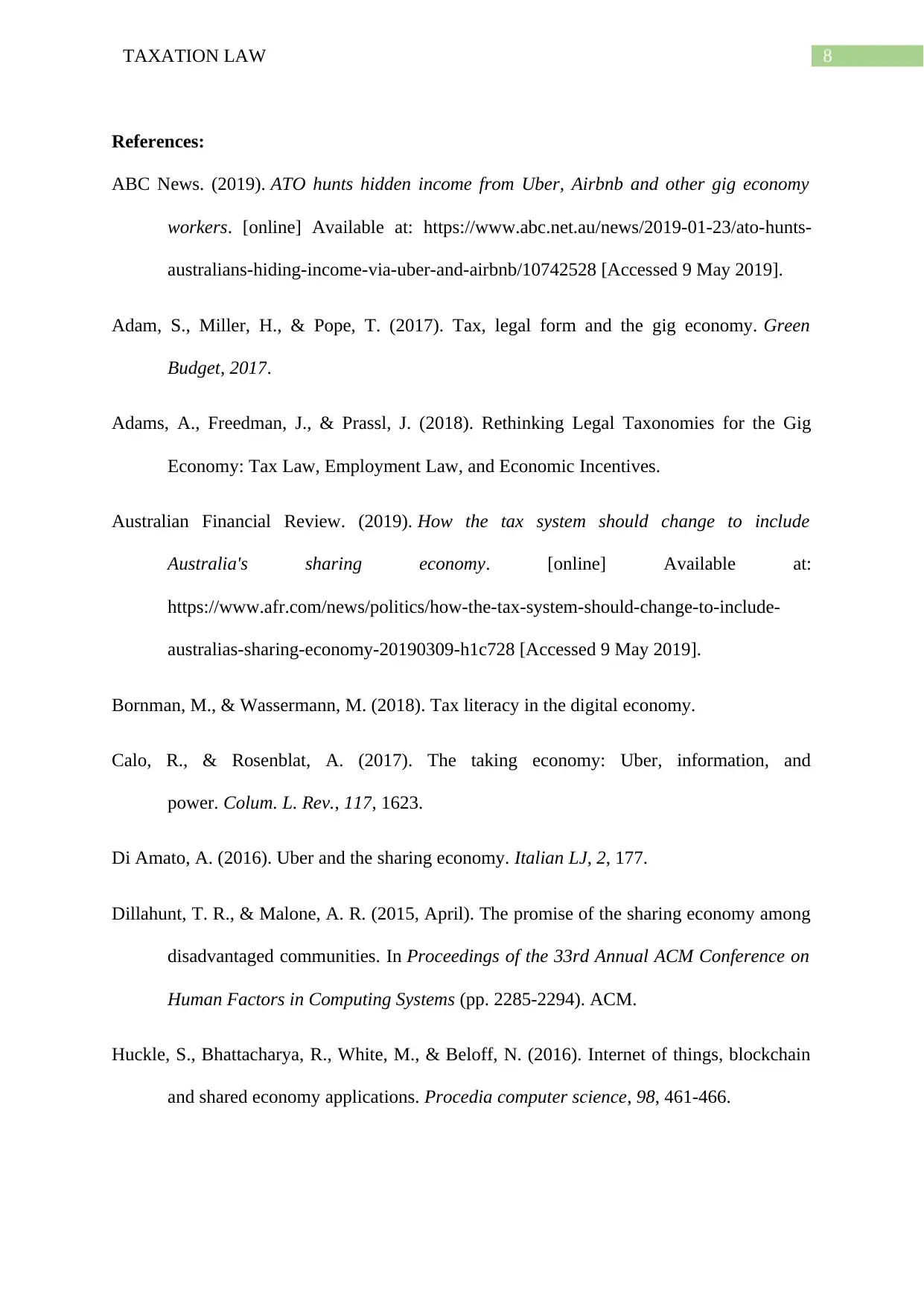
8TAXATION LAW
References:
ABC News. (2019). ATO hunts hidden income from Uber, Airbnb and other gig economy
workers. [online] Available at: https://www.abc.net.au/news/2019-01-23/ato-hunts-
australians-hiding-income-via-uber-and-airbnb/10742528 [Accessed 9 May 2019].
Adam, S., Miller, H., & Pope, T. (2017). Tax, legal form and the gig economy. Green
Budget, 2017.
Adams, A., Freedman, J., & Prassl, J. (2018). Rethinking Legal Taxonomies for the Gig
Economy: Tax Law, Employment Law, and Economic Incentives.
Australian Financial Review. (2019). How the tax system should change to include
Australia's sharing economy. [online] Available at:
https://www.afr.com/news/politics/how-the-tax-system-should-change-to-include-
australias-sharing-economy-20190309-h1c728 [Accessed 9 May 2019].
Bornman, M., & Wassermann, M. (2018). Tax literacy in the digital economy.
Calo, R., & Rosenblat, A. (2017). The taking economy: Uber, information, and
power. Colum. L. Rev., 117, 1623.
Di Amato, A. (2016). Uber and the sharing economy. Italian LJ, 2, 177.
Dillahunt, T. R., & Malone, A. R. (2015, April). The promise of the sharing economy among
disadvantaged communities. In Proceedings of the 33rd Annual ACM Conference on
Human Factors in Computing Systems (pp. 2285-2294). ACM.
Huckle, S., Bhattacharya, R., White, M., & Beloff, N. (2016). Internet of things, blockchain
and shared economy applications. Procedia computer science, 98, 461-466.
References:
ABC News. (2019). ATO hunts hidden income from Uber, Airbnb and other gig economy
workers. [online] Available at: https://www.abc.net.au/news/2019-01-23/ato-hunts-
australians-hiding-income-via-uber-and-airbnb/10742528 [Accessed 9 May 2019].
Adam, S., Miller, H., & Pope, T. (2017). Tax, legal form and the gig economy. Green
Budget, 2017.
Adams, A., Freedman, J., & Prassl, J. (2018). Rethinking Legal Taxonomies for the Gig
Economy: Tax Law, Employment Law, and Economic Incentives.
Australian Financial Review. (2019). How the tax system should change to include
Australia's sharing economy. [online] Available at:
https://www.afr.com/news/politics/how-the-tax-system-should-change-to-include-
australias-sharing-economy-20190309-h1c728 [Accessed 9 May 2019].
Bornman, M., & Wassermann, M. (2018). Tax literacy in the digital economy.
Calo, R., & Rosenblat, A. (2017). The taking economy: Uber, information, and
power. Colum. L. Rev., 117, 1623.
Di Amato, A. (2016). Uber and the sharing economy. Italian LJ, 2, 177.
Dillahunt, T. R., & Malone, A. R. (2015, April). The promise of the sharing economy among
disadvantaged communities. In Proceedings of the 33rd Annual ACM Conference on
Human Factors in Computing Systems (pp. 2285-2294). ACM.
Huckle, S., Bhattacharya, R., White, M., & Beloff, N. (2016). Internet of things, blockchain
and shared economy applications. Procedia computer science, 98, 461-466.
⊘ This is a preview!⊘
Do you want full access?
Subscribe today to unlock all pages.

Trusted by 1+ million students worldwide
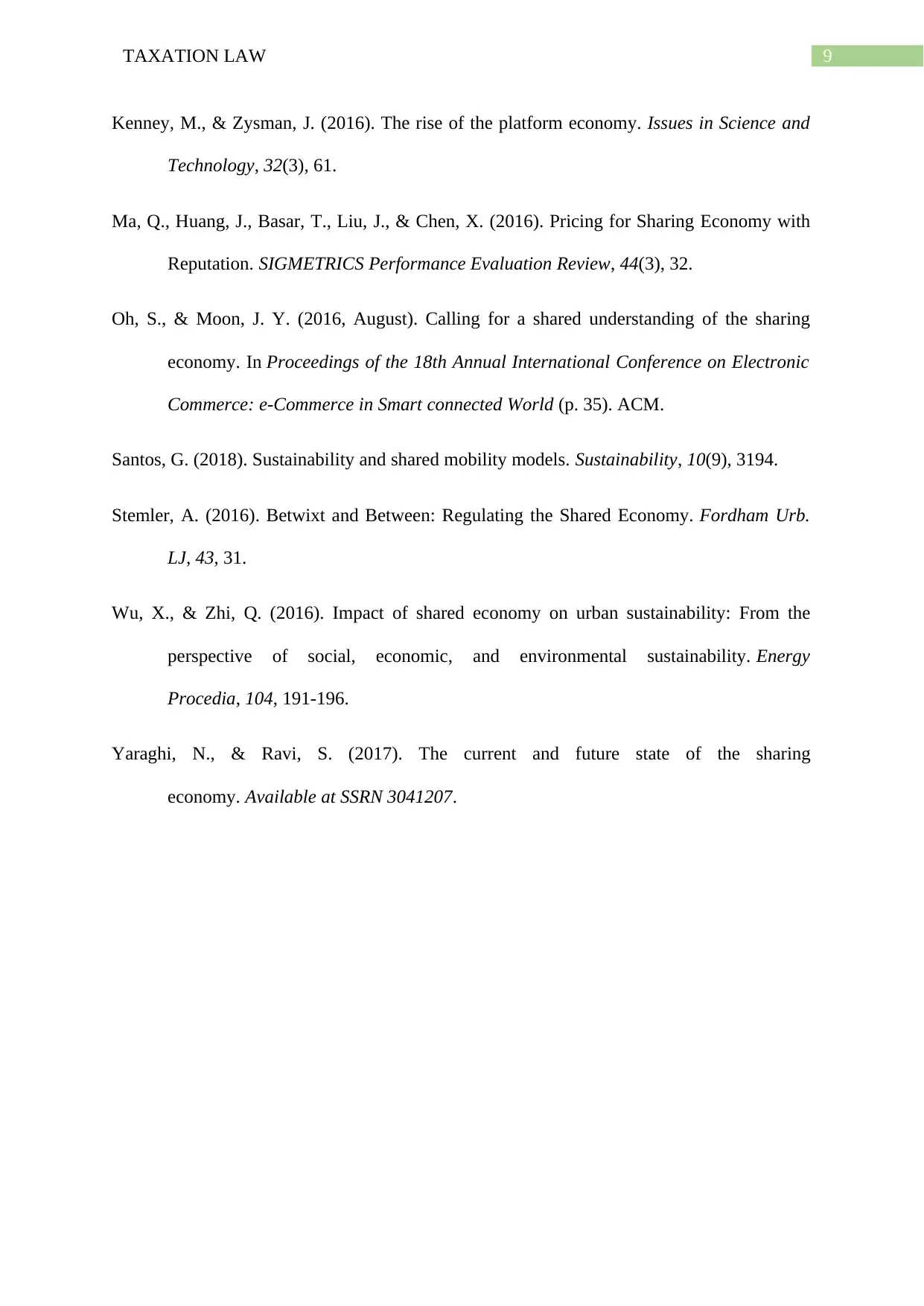
9TAXATION LAW
Kenney, M., & Zysman, J. (2016). The rise of the platform economy. Issues in Science and
Technology, 32(3), 61.
Ma, Q., Huang, J., Basar, T., Liu, J., & Chen, X. (2016). Pricing for Sharing Economy with
Reputation. SIGMETRICS Performance Evaluation Review, 44(3), 32.
Oh, S., & Moon, J. Y. (2016, August). Calling for a shared understanding of the sharing
economy. In Proceedings of the 18th Annual International Conference on Electronic
Commerce: e-Commerce in Smart connected World (p. 35). ACM.
Santos, G. (2018). Sustainability and shared mobility models. Sustainability, 10(9), 3194.
Stemler, A. (2016). Betwixt and Between: Regulating the Shared Economy. Fordham Urb.
LJ, 43, 31.
Wu, X., & Zhi, Q. (2016). Impact of shared economy on urban sustainability: From the
perspective of social, economic, and environmental sustainability. Energy
Procedia, 104, 191-196.
Yaraghi, N., & Ravi, S. (2017). The current and future state of the sharing
economy. Available at SSRN 3041207.
Kenney, M., & Zysman, J. (2016). The rise of the platform economy. Issues in Science and
Technology, 32(3), 61.
Ma, Q., Huang, J., Basar, T., Liu, J., & Chen, X. (2016). Pricing for Sharing Economy with
Reputation. SIGMETRICS Performance Evaluation Review, 44(3), 32.
Oh, S., & Moon, J. Y. (2016, August). Calling for a shared understanding of the sharing
economy. In Proceedings of the 18th Annual International Conference on Electronic
Commerce: e-Commerce in Smart connected World (p. 35). ACM.
Santos, G. (2018). Sustainability and shared mobility models. Sustainability, 10(9), 3194.
Stemler, A. (2016). Betwixt and Between: Regulating the Shared Economy. Fordham Urb.
LJ, 43, 31.
Wu, X., & Zhi, Q. (2016). Impact of shared economy on urban sustainability: From the
perspective of social, economic, and environmental sustainability. Energy
Procedia, 104, 191-196.
Yaraghi, N., & Ravi, S. (2017). The current and future state of the sharing
economy. Available at SSRN 3041207.
1 out of 10
Related Documents
Your All-in-One AI-Powered Toolkit for Academic Success.
+13062052269
info@desklib.com
Available 24*7 on WhatsApp / Email
![[object Object]](/_next/static/media/star-bottom.7253800d.svg)
Unlock your academic potential
Copyright © 2020–2026 A2Z Services. All Rights Reserved. Developed and managed by ZUCOL.





